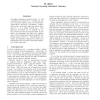Free Online Productivity Tools
i2Speak
i2Symbol
i2OCR
iTex2Img
iWeb2Print
iWeb2Shot
i2Type
iPdf2Split
iPdf2Merge
i2Bopomofo
i2Arabic
i2Style
i2Image
i2PDF
iLatex2Rtf
Sci2ools
IJCAI
1997
1997
Let's Plan It Deductively!
The paper describes a transition logic, TL, and a deductive formalism for it. It shows how various important aspects (such as ramification, qualification, specificity, simultaneity, indeterminism etc.) involved in planning can be modelled in TL in a rather natural way. (The deductive formalism for) TL extends the linear connection method proposed earlier by the author by embedding the latter into classical logic, so that classical and resource-sensitiv reasoning coexist within TL. The attraction of a logical and deductive approach to planning is emphasised and the state of automated deduction briefly described.
Deductive Formalism | IJCAI 1997 | IJCAI 2007 | Resource-sensitiv Reasoning Coexist | Various Important Aspects |
Related Content
| Added | 01 Nov 2010 |
| Updated | 01 Nov 2010 |
| Type | Conference |
| Year | 1997 |
| Where | IJCAI |
| Authors | Wolfgang Bibel |
Comments (0)

